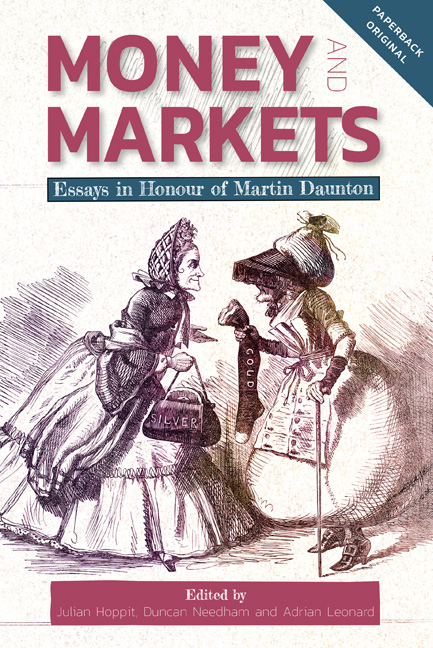Book contents
- Frontmatter
- Contents
- List of Figures
- List of Tables
- List of Contributors
- List of Abbreviations
- Introduction
- 1 Taxing London and the British Fiscal State, 1660–1815
- 2 Rents, Squalor, and the Land Question: Progress and Poverty
- 3 Marine Insurers, the City of London, and Financing the Napoleonic Wars
- 4 The Political Economy of Sir Robert Peel
- 5 Champagne Capitalism: France’s Adaptation to Britain’s Global Hegemony, 1830–80
- 6 The 1848 Revolution in Prussia: a Financial Interpretation
- 7 Imperial Germany, Great Britain and the Political Economy of the Gold Standard, 1867–1914
- 8 Knowledge, Contestation and Authority in the Eurodollar Market, 1959–64
- 9 Continuity and Change in British Conservative Taxation Policy, c. 1964–88
- 10 Britain Since the 1970s: a Transition to Neo-Liberalism?
- 11 Maplin: the Treasury and London’s Third Airport in the 1970s
- 12 Workfare and the Reinvention of the Social in America and Britain, c. 1965 to 1985
- 13 Charity and International Humanitarianism in Post-War Britain
- 14 Discounting Time
- 15 The Material Politics of Energy Disruption: Managing Shortages Amidst Rising Expectations, Britain 1930s–60s
- The Published Writings of Martin J. Daunton
- Index
- People, Markets, Goods: Economies and Societies in History ISSN: 2051-7467
6 - The 1848 Revolution in Prussia: a Financial Interpretation
Published online by Cambridge University Press: 13 April 2021
- Frontmatter
- Contents
- List of Figures
- List of Tables
- List of Contributors
- List of Abbreviations
- Introduction
- 1 Taxing London and the British Fiscal State, 1660–1815
- 2 Rents, Squalor, and the Land Question: Progress and Poverty
- 3 Marine Insurers, the City of London, and Financing the Napoleonic Wars
- 4 The Political Economy of Sir Robert Peel
- 5 Champagne Capitalism: France’s Adaptation to Britain’s Global Hegemony, 1830–80
- 6 The 1848 Revolution in Prussia: a Financial Interpretation
- 7 Imperial Germany, Great Britain and the Political Economy of the Gold Standard, 1867–1914
- 8 Knowledge, Contestation and Authority in the Eurodollar Market, 1959–64
- 9 Continuity and Change in British Conservative Taxation Policy, c. 1964–88
- 10 Britain Since the 1970s: a Transition to Neo-Liberalism?
- 11 Maplin: the Treasury and London’s Third Airport in the 1970s
- 12 Workfare and the Reinvention of the Social in America and Britain, c. 1965 to 1985
- 13 Charity and International Humanitarianism in Post-War Britain
- 14 Discounting Time
- 15 The Material Politics of Energy Disruption: Managing Shortages Amidst Rising Expectations, Britain 1930s–60s
- The Published Writings of Martin J. Daunton
- Index
- People, Markets, Goods: Economies and Societies in History ISSN: 2051-7467
Summary
When it comes to revolutions, the gold standard is 1789 in France. By that measure the events in 1848 have been found wanting, the farce to 1789's tragedy. But should all the revolutions that year be tarred with the same brush? True, the issues at stake were the same in Berlin as in Paris: how to help the unemployed while ensuring that taxpayers were not abused. What differed was the Prussian solution, which was as bloodless it was enduring. The roots of British state power in the nineteenth century have been traced by Martin Daunton to its gradual cultivation of taxpayer and creditor trust. The roots of Prussian state power resulted from a much shorter but similarly effective process, one called the 1848 revolution.
Before the revolution: social issues
By the 1840s social pressures were mounting in Prussia. Its population had grown by 58 per cent between 1816 and 1849. With landownership relatively immobile, the landless labouring class swelled and the number of artisanal Handwerker grew by 133 per cent. This left a large group of Prussians vulnerable to crop and economic failure. In 1845 and 1846 potato blight and a disastrous harvest led to food prices doubling and more. The result was food riots: in Prussia 158 such riots occurred in April–May 1847 alone. Famine was averted by the bountiful harvest of 1847, but the resultant squeeze on discretionary income caused a deep recession and credit crisis.
With unemployment rising sharply, welfare was pressing. But who bore responsibility for poor relief? Prussia's Allgemeines Landrecht of 1794 had acknowledged the state's duties. But this was a contingent responsibility, for in the first instance the local community and in the second, wealthy locals were liable. Even before the crisis, the costs of providing for the growing class of poor had been mounting. After 1846 the local communes struggled to meet their obligations. In Berlin, for instance, the population doubled between 1830 and 1851, but poor relief increased threefold, swallowing nearly 40 per cent of Berlin's budget in 1847. That March commentators such as Koenig worried about relying on the wealthier, for ‘nest-eggs have been consumed’. Increasing recourse to the central state was the result. Historians (and some contemporaries) have lamented Prussia's dilatory response to the welfare problem as reflecting dogmatic laissez faire principles.
- Type
- Chapter
- Information
- Money and MarketsEssays in Honour of Martin Daunton, pp. 109 - 126Publisher: Boydell & BrewerPrint publication year: 2019



